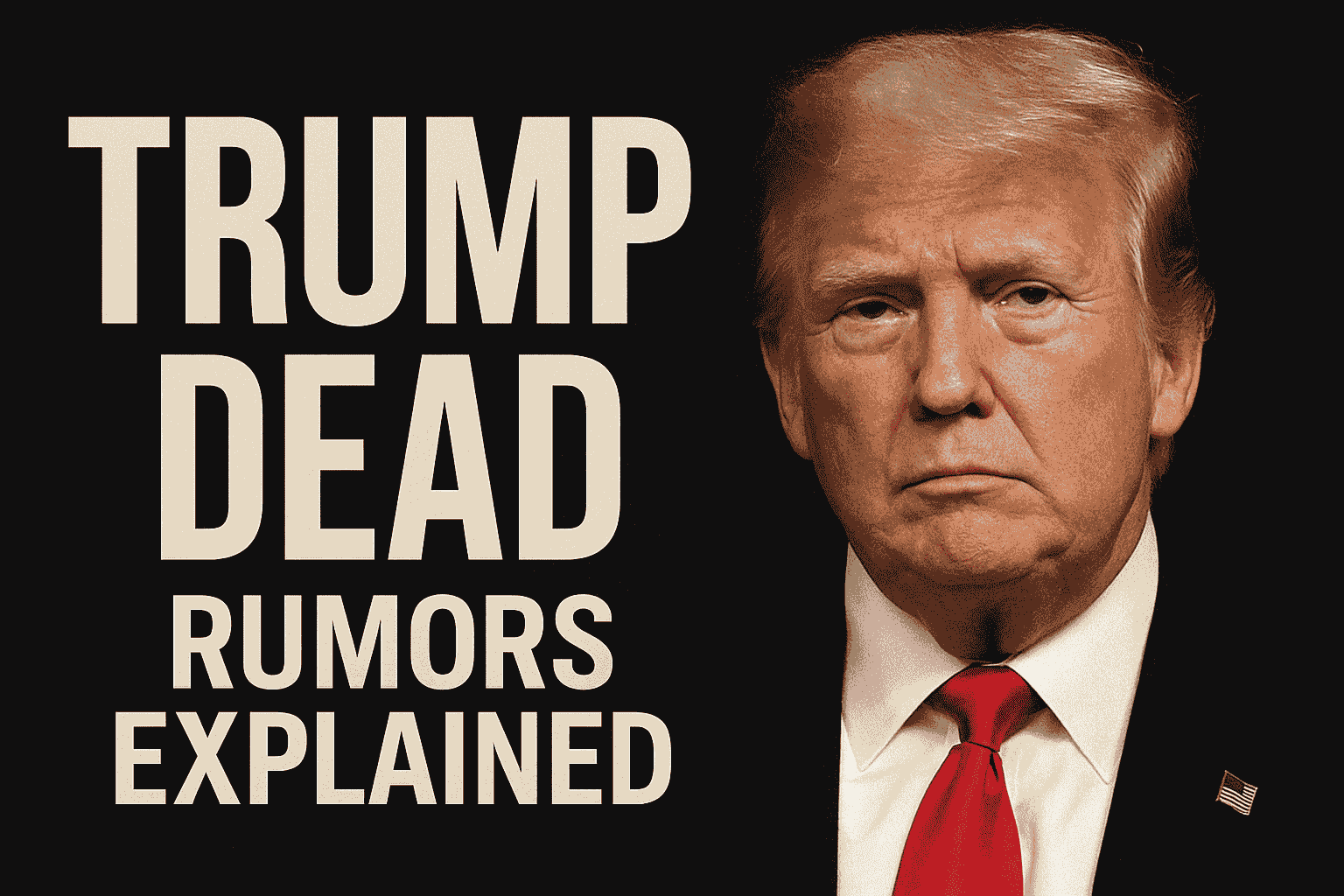Trump Dead Rumors Explained: Why the Fake News Keeps Trending
The phrase “Trump dead” has been trending on Google searches, Twitter, and Facebook many times in recent years. Each time, it sparks shock, confusion, and heated debates. But let’s set the record straight right away: Donald Trump is not dead. These claims are part of repeated misinformation campaigns, social media hoaxes, or clickbait tactics designed to generate traffic.
In this article, we’ll explore why the “Trump dead” rumor keeps surfacing, how political fake news spreads online, and why fact-checking has become more important than ever in today’s digital age.

Why Do “Trump Dead” Rumors Spread So Quickly?
Two big factors drive the spread of these fake death rumors:
- Social Media Virality – Platforms like Twitter (X), TikTok, and Facebook are fast-moving spaces where a single post can reach millions of people in minutes. A shocking headline such as “Trump Dead” grabs attention and is shared before users verify it.
- Political Polarization in the USA – Donald Trump has been one of the most polarizing figures in American politics. Because of this, both supporters and critics pay attention to any news about him, real or fake. This heightened interest makes hoaxes about his death spread faster than those about other public figures.
Is There Any Truth Behind the “Trump Dead” Headlines?
No, there is no truth to these claims. Whenever you see headlines like “Donald Trump found dead” or “Breaking: Trump dead at 78”, they are 100% fake news. Trusted news outlets such as CNN, Fox News, Reuters, or The Associated Press would immediately report such a major story if it were true.
In reality, these headlines come from:
- Clickbait websites trying to earn ad revenue.
- YouTube videos with misleading thumbnails.
- Satirical pages where content is exaggerated or false for entertainment.
- Fake screenshots made to look like they came from mainstream news outlets.

How Google Searches for “Trump Dead” Reflect Public Curiosity
When analyzing Google Trends, we see that spikes in searches for “Trump dead” usually happen after viral social media posts. This doesn’t necessarily mean people believe the rumor — many are simply searching to verify the news.
Search intent behind this keyword generally falls into three categories:
- Fact-checking: People want to confirm if Trump is actually dead.
- Curiosity: Some are intrigued by trending topics, regardless of truth.
- Political motivation: Certain groups may push or search for these terms to promote narratives that favor or oppose Trump.
The History of Celebrity and Politician Death Hoaxes
Trump isn’t the first public figure targeted by death hoaxes. Others have included:
- Elvis Presley – Rumors still circulate decades after his real death.
- Morgan Freeman – Declared “dead” multiple times online, despite being alive.
- Barack Obama and Joe Biden – Both have been targeted by fake “death” reports.
These hoaxes thrive because audiences are often more likely to click shocking, negative news than positive updates.
Why Fake News About Trump Can Be Dangerous
Two key reasons make these hoaxes problematic:
- Public Panic and Misinformation – When millions of people share unverified news, confusion spreads quickly. Some may believe it’s true, leading to unnecessary panic.
- Impact on Politics and Elections – Spreading fake news about politicians, especially during election cycles, can mislead voters or shift public opinion unfairly.
How to Fact-Check “Trump Dead” Claims
Before believing or sharing a rumor about Trump or any other public figure, use these steps:
- Check Trusted News Outlets – CNN, BBC, Fox News, Reuters, and AP will always cover real breaking news.
- Verify Social Media Sources – Look for blue checkmarks and official accounts.
- Use Fact-Checking Sites – Snopes and PolitiFact often debunk viral hoaxes quickly.
What Does This Say About Our Media Landscape?
The recurring “Trump dead” hoaxes highlight two major issues in American media:
- Declining Trust in News – People no longer know which sources to believe.
- The Click Economy – Outrage and shock equal more clicks, which fuels fake headlines.
The responsibility now lies with both media companies and everyday users to slow the spread of misinformation.
The Bigger Lesson: Don’t Fall for Viral Hoaxes
Two key lessons stand out:
- Always verify before sharing. If you see “Trump dead” trending, take a few seconds to check CNN, Fox News, or the New York Times.
- Understand the motives. Most hoaxes are designed to earn money from clicks or to sway political opinions.
Conclusion: The Truth Behind “Trump Dead”
At the end of the day, the rumors about Donald Trump being dead are nothing more than fake news hoaxes. They spread because of social media virality, political polarization, and the click-driven online economy.
For the USA audience especially, where politics is deeply divisive, it’s important to separate fact from fiction. Instead of fueling misinformation, we should rely on trusted sources, question viral claims, and educate others about the dangers of spreading fake news.
So next time you see “Trump dead” trending, you’ll know the truth: Donald Trump is alive, and the headlines are nothing but digital hoaxes.
Frequently Asked Questions About “Trump Dead” Rumors
Is Donald Trump dead?
No, Donald Trump is alive. Reports of his death are false.
Why do people keep saying Trump is dead?
These are hoaxes spread online to grab attention, make money, or influence politics.
Has Trump ever addressed these rumors?
Yes, in the past he has dismissed fake reports as “fake news.”
Are death hoaxes common for politicians?
Yes, many global leaders have been targeted by similar rumors.
What should I do if I see “Trump dead” trending?
Verify with reliable news outlets before sharing.



